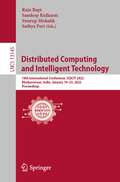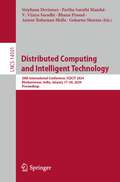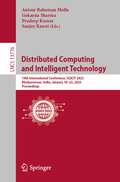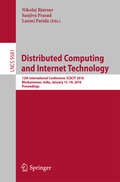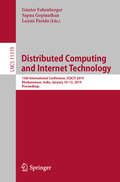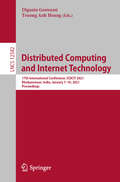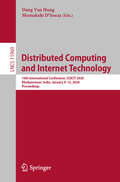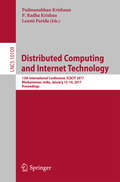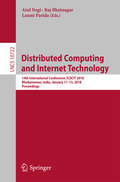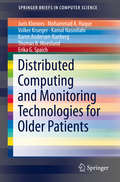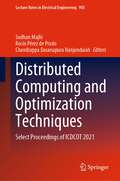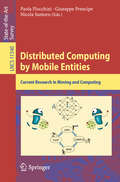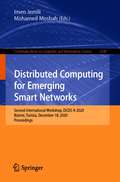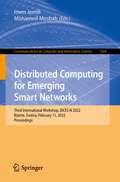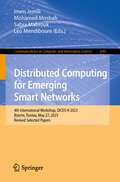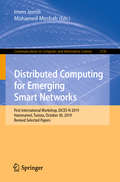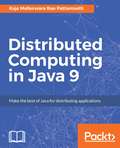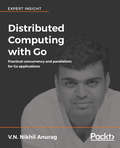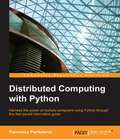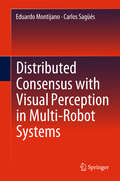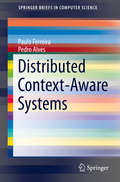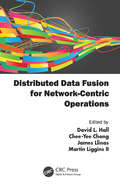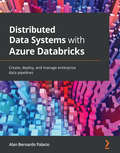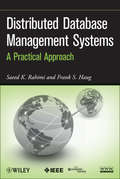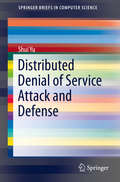- Table View
- List View
Distributed Computing and Intelligent Technology: 18th International Conference, ICDCIT 2022, Bhubaneswar, India, January 19–23, 2022, Proceedings (Lecture Notes in Computer Science #13145)
by Raju Bapi Sandeep Kulkarni Swarup Mohalik Sathya PeriThis book constitutes the proceedings of the 18th International Conference on Distributed Computing and Intelligent Technology, ICDCIT 2022, held in Bhubaneswar, India, in January 20212. The 11 full papers presented together with 4 short papers were carefully reviewed and selected from 50 submissions. There are also 4 invited papers included. The papers were organized in topical sections named: invited papers, distributed computing and intelligent technology.
Distributed Computing and Intelligent Technology: 20th International Conference, ICDCIT 2024, Bhubaneswar, India, January 17–20, 2024, Proceedings (Lecture Notes in Computer Science #14501)
by Stéphane Devismes Partha Sarathi Mandal V. Vijaya Saradhi Bhanu Prasad Anisur Rahaman Molla Gokarna SharmaThis book constitutes the refereed proceedings of the 20th International Conference on Distributed Computing and Intelligent Technology, ICDCIT 2024, which was held in Bhubaneswar, India, during January 17–20, 2024. The 24 full papers presented in this volume were carefully reviewed and selected from 116 submissions. The papers are organized in the following topical sections: Distributed Computing (DC) and Intelligent Technology (IT). The DC track solicits original research papers contributing to the foundations and applications of distributed computing, whereas the IT track solicits original research papers contributing to the foundations and applications of Intelligent Technology.
Distributed Computing and Intelligent Technology: 19th International Conference, ICDCIT 2023, Bhubaneswar, India, January 18–22, 2023, Proceedings (Lecture Notes in Computer Science #13776)
by Anisur Rahaman Molla Gokarna Sharma Pradeep Kumar Sanjay RawatThis book constitutes the proceedings of the 19th International Conference on Distributed Computing and Intelligent Technology, ICDCIT 2023, which was held in Bhubaneswar, India, in January 2023.The 20 full papers and 9 short papers presented in this volume were carefully reviewed and selected from 55 submissions. The papers are organized in the following topical sections: Invited Talks; Distributed Computing; Intelligent Technology.
Distributed Computing and Internet Technology
by Nikolaj Bjørner Sanjiva Prasad Laxmi ParidaThis bookconstitutes the proceedings of the 12th International Conference on DistributedComputing and Internet Technology, ICDCIT 2016, held in Bhubaneswar, India, inJanuary 2016. The 6 fullpapers, 7 short papers and 11 poster papers presented in this volume werecarefully reviewed and selected from 129 submissions. The ICDCIT conferencefocusses on distributed computing, internet technologies, and societalapplications. The book also contains 3 full paper invited talks.
Distributed Computing and Internet Technology: 15th International Conference, ICDCIT 2019, Bhubaneswar, India, January 10–13, 2019, Proceedings (Lecture Notes in Computer Science #11319)
by Günter Fahrnberger Sapna Gopinathan Laxmi ParidaThis book constitutes the proceedings of the 15th International Conference on Distributed Computing and Internet Technology, ICDCIT 2019, held in Bhubaneswar, India, in January 2019.The 18 full papers and 14 short papers presented together with 5 invited papers were carefully reviewed and selected from 115 submissions. The papers present research in three areas: distributed computing, Internet technologies, and societal applications.
Distributed Computing and Internet Technology: 17th International Conference, ICDCIT 2021, Bhubaneswar, India, January 7–10, 2021, Proceedings (Lecture Notes in Computer Science #12582)
by Diganta Goswami Truong Anh HoangThis book constitutes the proceedings of the 17th International Conference on Distributed Computing and Internet Technology, ICDCIT 2020, held in Bhubaneswar, India, in January 2021. The 13 full papers presented together with 4 short papers were carefully reviewed and selected from 99 submissions. The papers were organized in topical sections named: invited talks, cloud computing and networks, distributed algorithms, concurrency and parallelism, graph algorithms and security, social networks and machine learning, and short papers.
Distributed Computing and Internet Technology: 16th International Conference, ICDCIT 2020, Bhubaneswar, India, January 9–12, 2020, Proceedings (Lecture Notes in Computer Science #11969)
by Dang Van Hung Meenakshi D’SouzaThis book constitutes the proceedings of the 16th International Conference on Distributed Computing and Internet Technology, ICDCIT 2020, held in Bhubaneswar, India, in January 2020. The 20 full and 3 short papers presented in this volume were carefully reviewed and selected from 110 submissions. In addition, the book included 6 invited papers. The contributions were organized in topical sections named: invited talks; concurrent and distributed systems modelling and verification; cloud and grid computing; social networks, machine learning and mobile networks; data processing and blockchain technology; and short papers.
Distributed Computing and Internet Technology
by Padmanabhan Krishnan P. Radha Krishna Laxmi ParidaThis book constitutes the proceedings of the 13th International Conference on Distributed Computing and Internet Technology, ICDCIT 2017, held in Bhubaneswar, India, in January 2017. The 17 full papers and 3 poster papers presented together with 6 abstracts of invited talks were carefully reviewed and selected from 208 submissions (118 abstract and 90 full paper submissions). The ICDCIT conference focusses on mobile computing; analytics; distributed computing; virtual machines; access control; and security and privacy.
Distributed Computing and Internet Technology
by Atul Negi Raj Bhatnagar Laxmi ParidaThis book constitutes the proceedings of the 13th International Conference on Distributed Computing and Internet Technology, ICDCIT 2017, held in Bhubaneswar, India, in January 2017. The 17 full papers and 3 poster papers presented together with 6 abstracts of invited talks were carefully reviewed and selected from 208 submissions (118 abstract and 90 full paper submissions). The ICDCIT conference focusses on mobile computing; analytics; distributed computing; virtual machines; access control; and security and privacy.
Distributed Computing and Monitoring Technologies for Older Patients
by Juris Klonovs Mohammad A. Haque Volker Krueger Kamal Nasrollahi Karen Andersen-Ranberg Thomas B. Moeslund Erika G. SpaichThis book summarizes various approaches for theautomatic detection of health threats to older patients at home living alone. Thetext begins by briefly describing those who would most benefit from healthcaresupervision. The book then summarizes possible scenarios for monitoring anolder patient at home, deriving the common functional requirements formonitoring technology. Next, the work identifies the state of the art oftechnological monitoring approaches that are practically applicable to geriatricpatients. A survey is presented on a range of such interdisciplinary fields assmart homes, telemonitoring, ambient intelligence, ambient assisted living,gerontechnology, and aging-in-place technology. The book discusses relevantexperimental studies, highlighting the application of sensor fusion, signalprocessing and machine learning techniques. Finally, the text discusses futurechallenges, offering a number of suggestions for further research directions.
Distributed Computing and Optimization Techniques: Select Proceedings of ICDCOT 2021 (Lecture Notes in Electrical Engineering #903)
by Sudhan Majhi Rocío Pérez de Prado Chandrappa Dasanapura NanjundaiahThis book introduces research presented at the International Conference on Distributed Computing and Optimization Techniques (ICDCOT–2021), a two-day conference, where researchers, engineers, and academicians from all over the world came together to share their experiences and findings on all aspects of distributed computing and its applications in diverse areas. The book includes papers on distributed computing, intelligent system, optimization method, mathematical modeling, fuzzy logic, neural networks, grid computing, load balancing, communication. It will be a valuable resource for students, academics, and practitioners in the industry working on distributed computing.
Distributed Computing by Mobile Entities: Current Research in Moving and Computing (Lecture Notes in Computer Science #11340)
by Paola Flocchini Giuseppe Prencipe Nicola SantoroDistributed Computing by Mobile Entities is concerned with the study of the computational and complexity issues arising in systems of decentralized computational entities operating in a spatial universe Encompassing and modeling a large variety of application environments and systems, from robotic swarms to networks of mobile sensors, from software mobile agents in communication networks to crawlers and viruses on the web, the theoretical research in this area intersects distributed computing with the fields of computational geometry (especially for continuous spaces), control theory, graph theory and combinatorics (especially for discrete spaces). The research focus is on determining what tasks can be performed by the entities, under what conditions, and at what cost. In particular, the central question is to determine what minimal hypotheses allow a given problem to be solved. This book is based on the lectures and tutorial presented at the research meeting on “Moving and Computing" (mac) held at La Maddalena Island in June 2017. Greatly expanded, revised and updated, each of the lectures forms an individual Chapter. Together, they provide a map of the current knowledge about the boundaries of distributed computing by mobile entities.
Distributed Computing for Emerging Smart Networks: Second International Workshop, DiCES-N 2020, Bizerte, Tunisia, December 18, 2020, Proceedings (Communications in Computer and Information Science #1348)
by Imen Jemili Mohamed MosbahThis book constitutes the refereed proceedings of the Second International Workshop on Distributed Computing for Emerging Smart Networks, DiCES-N 2020, held in Bizerte, Tunisia, in December 2020. Due to the COVID-19 pandemic the conference was held online. The 8 full papers included in this volume were carefully reviewed and selected from numerous submissions. The papers are organized in the following topical sections: intelligent transportation systems; emerging networking technologies; artificial intelligence and internet of things.
Distributed Computing for Emerging Smart Networks: Third International Workshop, DiCES-N 2022, Bizerte, Tunisia, February 11, 2022, Proceedings (Communications in Computer and Information Science #1564)
by Imen Jemili Mohamed MosbahThis book constitutes the refereed proceedings of the Third International Workshop on Distributed Computing for Emerging Smart Networks, DiCES-N 2022, held in Bizerte, Tunisia, in February 2022. Due to the COVID-19 pandemic the conference was held online. The 5 full papers included in this volume were carefully reviewed and selected from 14 submissions. The volume also presents one invited paper. The papers are organized in topical sections on emerging networks and communications; cyber security of connected objects.
Distributed Computing for Emerging Smart Networks: 4th International Workshop, DiCES-N 2023, Bizerte, Tunisia, May 27, 2023, Revised Selected Papers (Communications in Computer and Information Science #2041)
by Imen Jemili Mohamed Mosbah Sabra Mabrouk Leo MendiboureThis book constitutes revised selected papers from the 4th International Workshop on Distributed Computing for Emerging Smart Networks, DiCES-N 2023, which took place in Bizerte, Tunisia, on May 27, 2023.The 6 full papers included in this book were carefully reviewed and selected from 13 submissions. The book also contains one invited talk. The contributions focus on vehicular networks and emerging technologies and cyber safety and security of intelligent transportation systems.
Distributed Computing for Emerging Smart Networks: First International Workshop, DiCES-N 2019, Hammamet, Tunisia, October 30, 2019, Revised Selected Papers (Communications in Computer and Information Science #1130)
by Mohamed Mosbah Imen JemiliThis book contains extended versions of the best papers presented at the First International Workshop on Distributed Computing for Emerging Smart Networks, DiCES-N 2019, held in Hammamet, Tunisia, in October 2019.The 9 revised full papers included in this volume were carefully reviewed and selected from 24 initial submissions. The papers are organized in the following topical sections: intelligent transportation systems; distributed computing for networking and communication; articial intelligence applied to cyber physical systems.
Distributed Computing in Java 9
by Raja Malleswara PattamsettiExplore the power of distributed computing to write concurrent, scalable applications in Java About This Book • Make the best of Java 9 features to write succinct code • Handle large amounts of data using HPC • Make use of AWS and Google App Engine along with Java to establish a powerful remote computation system Who This Book Is For This book is for basic to intermediate level Java developers who is aware of object-oriented programming and Java basic concepts. What You Will Learn • Understand the basic concepts of parallel and distributed computing/programming • Achieve performance improvement using parallel processing, multithreading, concurrency, memory sharing, and hpc cluster computing • Get an in-depth understanding of Enterprise Messaging concepts with Java Messaging Service and Web Services in the context of Enterprise Integration Patterns • Work with Distributed Database technologies • Understand how to develop and deploy a distributed application on different cloud platforms including Amazon Web Service and Docker CaaS Concepts • Explore big data technologies • Effectively test and debug distributed systems • Gain thorough knowledge of security standards for distributed applications including two-way Secure Socket Layer In Detail Distributed computing is the concept with which a bigger computation process is accomplished by splitting it into multiple smaller logical activities and performed by diverse systems, resulting in maximized performance in lower infrastructure investment. This book will teach you how to improve the performance of traditional applications through the usage of parallelism and optimized resource utilization in Java 9. After a brief introduction to the fundamentals of distributed and parallel computing, the book moves on to explain different ways of communicating with remote systems/objects in a distributed architecture. You will learn about asynchronous messaging with enterprise integration and related patterns, and how to handle large amount of data using HPC and implement distributed computing for databases. Moving on, it explains how to deploy distributed applications on different cloud platforms and self-contained application development. You will also learn about big data technologies and understand how they contribute to distributed computing. The book concludes with the detailed coverage of testing, debugging, troubleshooting, and security aspects of distributed applications so the programs you build are robust, efficient, and secure. Style and approach This is a step-by-step practical guide with real-world examples.
Distributed Computing with Go: Practical concurrency and parallelism for Go applications
by V.N. Nikhil AnuragA tutorial leading the aspiring Go developer to full mastery of Golang's distributed features. Key Features This book provides enough concurrency theory to give you a contextual understanding of Go concurrency It gives weight to synchronous and asynchronous data streams in Golang web applications It makes Goroutines and Channels completely familiar and natural to Go developers Book Description Distributed Computing with Go gives developers with a good idea how basic Go development works the tools to fulfill the true potential of Golang development in a world of concurrent web and cloud applications. Nikhil starts out by setting up a professional Go development environment. Then you’ll learn the basic concepts and practices of Golang concurrent and parallel development. You’ll find out in the new few chapters how to balance resources and data with REST and standard web approaches while keeping concurrency in mind. Most Go applications these days will run in a data center or on the cloud, which is a condition upon which the next chapter depends. There, you’ll expand your skills considerably by writing a distributed document indexing system during the next two chapters. This system has to balance a large corpus of documents with considerable analytical demands. Another use case is the way in which a web application written in Go can be consciously redesigned to take distributed features into account. The chapter is rather interesting for Go developers who have to migrate existing Go applications to computationally and memory-intensive environments. The final chapter relates to the rather onerous task of testing parallel and distributed applications, something that is not usually taught in standard computer science curricula. What you will learn Gain proficiency with concurrency and parallelism in Go Learn how to test your application using Go's standard library Learn industry best practices with technologies such as REST, OpenAPI, Docker, and so on Design and build a distributed search engine Learn strategies on how to design a system for web scale Who this book is for This book is for developers who are familiar with the Golang syntax and have a good idea of how basic Go development works. It would be advantageous if you have been through a web application product cycle, although it’s not necessary.
Distributed Computing with Python
by Francesco PierfedericiHarness the power of multiple computers using Python through this fast-paced informative guide About This Book * You'll learn to write data processing programs in Python that are highly available, reliable, and fault tolerant * Make use of Amazon Web Services along with Python to establish a powerful remote computation system * Train Python to handle data-intensive and resource hungry applications Who This Book Is For This book is for Python developers who have developed Python programs for data processing and now want to learn how to write fast, efficient programs that perform CPU-intensive data processing tasks. What You Will Learn * Get an introduction to parallel and distributed computing * See synchronous and asynchronous programming * Explore parallelism in Python * Distributed application with Celery * Python in the Cloud * Python on an HPC cluster * Test and debug distributed applications In Detail CPU-intensive data processing tasks have become crucial considering the complexity of the various big data applications that are used today. Reducing the CPU utilization per process is very important to improve the overall speed of applications. This book will teach you how to perform parallel execution of computations by distributing them across multiple processors in a single machine, thus improving the overall performance of a big data processing task. We will cover synchronous and asynchronous models, shared memory and file systems, communication between various processes, synchronization, and more. Style and Approach This example based, step-by-step guide will show you how to make the best of your hardware configuration using Python for distributing applications.
Distributed Consensus with Visual Perception in Multi-Robot Systems
by Eduardo Montijano Carlos SagüésThis monograph introduces novel responses to the different problems that arise when multiple robots need to execute a task in cooperation, each robot in the team having a monocular camera as its primary input sensor. Its central proposition is that a consistent perception of the world is crucial for the good development of any multi-robot application. The text focuses on the high-level problem of cooperative perception by a multi-robot system: the idea that, depending on what each robot sees and its current situation, it will need to communicate these things to its fellows whenever possible to share what it has found and keep updated by them in its turn. However, in any realistic scenario, distributed solutions to this problem are not trivial and need to be addressed from as many angles as possible. Distributed Consensus with Visual Perception in Multi-Robot Systems covers a variety of related topics such as: * distributed consensus algorithms; * data association and robustness problems; * convergence speed; and * cooperative mapping. The book first puts forward algorithmic solutions to these problems and then supports them with empirical validations working with real images. It provides the reader with a deeper understanding of the problems associated to the perception of the world by a team of cooperating robots with onboard cameras. Academic researchers and graduate students working with multi-robot systems, or investigating problems of distributed control or computer vision and cooperative perception will find this book of material assistance with their studies.
Distributed Context-Aware Systems
by Paulo Ferreira Pedro AlvesContext-aware systems aim to deliver a rich user experience by taking into account the current user context (location, time, activity, etc. ), possibly captured without his intervention. For example, cell phones are now able to continuously update a user's location while, at the same time, users execute an increasing amount of activities online, where their actions may be easily captured (e. g. login in a web application) without user consent. In the last decade, this topic has seen numerous developments that demonstrate its relevance and usefulness. The trend was accelerated with the widespread availability of powerful mobile devices (e. g. smartphones) that include a myriad of sensors which enable applications to capture the user context. However, there are several challenges that must be addressed; we focus on scalability (large number of context aware messages) and privacy (personal data that may be propagated). This book is organized in five chapters starting with an introduction to the theme raising the most important challenges. Then, chapter two presents several important definitions (establishing a common ground for the following chapters) and taxonomy. These are important to chapter three which describes some of the most relevant distributed context-aware systems that can be classified according to the taxonomy. Privacy is addressed in chapter four and chapter five presents some important conclusions. The audience for this book is wide; researchers, students and professionals interested in the areas addressed will find the most relevant information regarding scalability and privacy in distributed context-aware systems.
Distributed Data Fusion for Network-Centric Operations
by David L. Hall Chee-Yee Chong James Llinas Martin Liggins IIWith the recent proliferation of service-oriented architectures (SOA), cloud computing technologies, and distributed-interconnected systems, distributed fusion is taking on a larger role in a variety of applications—from environmental monitoring and crisis management to intelligent buildings and defense. Drawing on the work of leading experts around the world, Distributed Data Fusion for Network-Centric Operations examines the state of the art of data fusion in a distributed sensing, communications, and computing environment. Get Insight into Designing and Implementing Data Fusion in a Distributed Network Addressing the entirety of information fusion, the contributors cover everything from signal and image processing, through estimation, to situation awareness. In particular, the work offers a timely look at the issues and solutions involving fusion within a distributed network enterprise. These include critical design problems, such as how to maintain a pedigree of agents or nodes that receive information, provide their contribution to the dataset, and pass to other network components. The book also tackles dynamic data sharing within a network-centric enterprise, distributed fusion effects on state estimation, graph-theoretic methods to optimize fusion performance, human engineering factors, and computer ontologies for higher levels of situation assessment. A comprehensive introduction to this emerging field and its challenges, the book explores how data fusion can be used within grid, distributed, and cloud computing architectures. Bringing together both theoretical and applied research perspectives, this is a valuable reference for fusion researchers and practitioners. It offers guidance and insight for those working on the complex issues of designing and implementing distributed, decentralized information fusion.
Distributed Data Systems with Azure Databricks: Create, deploy, and manage enterprise data pipelines
by Alan Bernardo PalacioQuickly build and deploy massive data pipelines and improve productivity using Azure DatabricksKey FeaturesGet to grips with the distributed training and deployment of machine learning and deep learning modelsLearn how ETLs are integrated with Azure Data Factory and Delta LakeExplore deep learning and machine learning models in a distributed computing infrastructureBook DescriptionMicrosoft Azure Databricks helps you to harness the power of distributed computing and apply it to create robust data pipelines, along with training and deploying machine learning and deep learning models. Databricks' advanced features enable developers to process, transform, and explore data. Distributed Data Systems with Azure Databricks will help you to put your knowledge of Databricks to work to create big data pipelines. The book provides a hands-on approach to implementing Azure Databricks and its associated methodologies that will make you productive in no time. Complete with detailed explanations of essential concepts, practical examples, and self-assessment questions, you'll begin with a quick introduction to Databricks core functionalities, before performing distributed model training and inference using TensorFlow and Spark MLlib. As you advance, you'll explore MLflow Model Serving on Azure Databricks and implement distributed training pipelines using HorovodRunner in Databricks. Finally, you'll discover how to transform, use, and obtain insights from massive amounts of data to train predictive models and create entire fully working data pipelines. By the end of this MS Azure book, you'll have gained a solid understanding of how to work with Databricks to create and manage an entire big data pipeline.What you will learnCreate ETLs for big data in Azure DatabricksTrain, manage, and deploy machine learning and deep learning modelsIntegrate Databricks with Azure Data Factory for extract, transform, load (ETL) pipeline creationDiscover how to use Horovod for distributed deep learningFind out how to use Delta Engine to query and process data from Delta LakeUnderstand how to use Data Factory in combination with DatabricksUse Structured Streaming in a production-like environmentWho this book is forThis book is for software engineers, machine learning engineers, data scientists, and data engineers who are new to Azure Databricks and want to build high-quality data pipelines without worrying about infrastructure. Knowledge of Azure Databricks basics is required to learn the concepts covered in this book more effectively. A basic understanding of machine learning concepts and beginner-level Python programming knowledge is also recommended.
Distributed Database Management Systems: A Practical Approach
by Saeed K. Rahimi Frank S. HaugThis book addresses issues related to managing data across a distributed database system. It is unique because it covers traditional database theory and current research, explaining the difficulties in providing a unified user interface and global data dictionary. The book gives implementers guidance on hiding discrepancies across systems and creating the illusion of a single repository for users. It also includes three sample frameworks—implemented using J2SE with JMS, J2EE, and Microsoft .Net—that readers can use to learn how to implement a distributed database management system. IT and development groups and computer sciences/software engineering graduates will find this guide invaluable.
Distributed Denial of Service Attack and Defense
by Shui YuThis brief provides readers a complete and self-contained resource for information about DDoS attacks and how to defend against them. It presents the latest developments in this increasingly crucial field along with background context and survey material. The book also supplies an overview of DDoS attack issues, DDoS attack detection methods, DDoS attack source traceback, and details on how hackers organize DDoS attacks. The author concludes with future directions of the field, including the impact of DDoS attacks on cloud computing and cloud technology. The concise yet comprehensive nature of this brief makes it an ideal reference for researchers and professionals studying DDoS attacks. It is also a useful resource for graduate students interested in cyberterrorism and networking.
